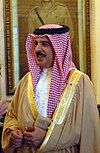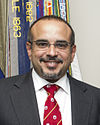Bahrain Defence Force
| Bahrain Defence Force | |
|---|---|
| قوة دفاع البحرين | |
 | |
| Founded | 1968 |
| Service branches | |
| Website | www |
| Leadership | |
| Supreme Commander | Hamad bin Isa Al Khalifa |
| Deputy Supreme Commander | Salman bin Hamad Al Khalifa |
| Commander-in-chief | Khalifa bin Ahmed Al Khalifa |
| Minister for Defence Affairs | Abdulla bin Hasan Al Nuaimi |
| Chief of Staff | Theyab bin Saqer Al Noaimi |
| Personnel | |
| Active personnel | 8,200[1] |
| Expenditure | |
| Budget | $1.5 billion (2022) |
| Percent of GDP | 3.4% (2022) |
| Related articles | |
| Ranks | Military ranks of Bahrain |
 |
|---|
|
|
| Judiciary |
| Administrative divisions (governorates) |
|
|
The Bahrain Defence Force (Arabic: قوة دفاع البحرين, abbreviated BDF) is the military force of the Kingdom of Bahrain. The Bahrain Defence Force is under the direct command and leadership of a commander-in-chief who holds the rank of field marshal. The Government has a Minister of Defence Affairs, responsible for BDF representation in the Cabinet.
The BDF numbers about 18,000 personnel[2] and consists of the Royal Bahraini Air Force, Royal Bahraini Army, Royal Bahraini Navy and the Royal Guard. Apart from the BDF, the public security forces and the Coast Guard report to the Ministry of Interior.
In January 2008, Crown Prince Salman bin Hamad bin Isa Al Khalifa, was appointed as the Deputy Supreme Commander,[3] while Khalifa bin Ahmed Al Khalifa was appointed Commander-in-Chief of the BDF.[4] BDF's Chief of Staff is Lieutenant General Theyab bin Saqer Al Noaimi.
GCC support
Bahrain, in conjunction with its GCC partners, has moved to upgrade its defenses in response to the threat posed by the Iran-Iraq and Persian Gulf wars.
In 1982, the GCC gave Bahrain $1.7 billion to help improve its defenses. Bahrain's defense spending since 1999 has been steady. The government spends around $320 million annually on the military.
U.S. support
After the Gulf War, Bahrain received additional military support from the United States, including the sale of 54 M60A3 tanks, 12 F-16C/D aircraft, and 14 Cobra helicopters. Joint naval, air and military exercises also have been planned and executed to increase readiness throughout the Persian Gulf. Bahrain and the United States signed a Defense Cooperation Agreement in October 1991, granting U.S. forces access to Bahraini facilities and ensuring the right to pre-position material for future crises. In 2003, George W. Bush designated Bahrain as a major non-NATO ally of the United States. Since 2003, Bahrain has been granted over $100 million in Foreign Military Funding to pay for various high-profile weapons systems, to include an AN/TPS-59(v)3B Early Warning Radar, Large Aircraft Infrared Countermeasures (LAIRCM), Air-to-Air Missile Avoidance System for the King's Plane (Boeing 747-400), as well as an Avenger Air Defense Vehicle.
In 2024, Bahrain, the US and are the Western countries took part in the 2024 missile strikes in Yemen. [5]
Commanders-in-Chief of the BDF
| # | Name | Picture | Took office | Left office |
|---|---|---|---|---|
| 1 | Hamad bin Isa Al Khalifa | 
|
1969 | 1999 |
| 2 | Salman bin Hamad bin Isa Al Khalifa | 
|
1999 | 2008 |
| 3 | Khalifa bin Ahmed Al Khalifa | 
|
2008 | Incumbent |
See also
References
- ^ IISS (2023). The Military Balance 2023. pp. 318–319.
- ^ "Bahrain". The 2011 US Department of State Background Notes. United States Department of State. Retrieved 2 March 2012.
The Bahrain Defense Force (BDF) numbers about 113,000 personnel.
- ^ "Royal Decree No 1 of the Year 2008 on the Appointment of the Deputy Supreme Commander". Official Gazette of the Kingdom of Bahrain. 6 January 2008. Archived from the original on 27 November 2012.
- ^ "Royal Decree No 2 of the Year 2008 on the Appointment of the Commander-in-Chief of the Bahrain Defence Force". Official Gazette of the Kingdom of Bahrain. 6 January 2008. Archived from the original on 8 December 2012.
- ^ "Explainer: Why Bahrain supported US strikes on Yemen's Houthis - Al-Monitor: Independent, trusted coverage of the Middle East". 12 January 2024.
External links
- Official site
- Background Note: Bahrain - Defense U.S. Department of State
